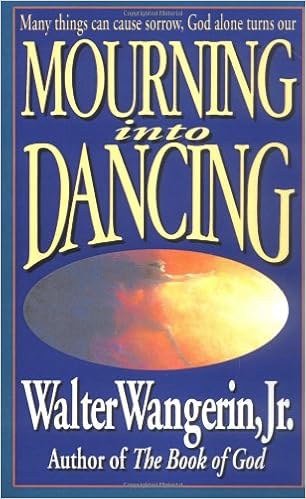 Since I’ve been diagnosed with Primary Lateral Sclerosis, the devil has been craving my faith (1 Peter 5:8,9). Days have dawned when I’ve doubted God. Doubted his goodness. Doubted his love. Doubted even his existence. (Thankfully, that’s rare.)
Since I’ve been diagnosed with Primary Lateral Sclerosis, the devil has been craving my faith (1 Peter 5:8,9). Days have dawned when I’ve doubted God. Doubted his goodness. Doubted his love. Doubted even his existence. (Thankfully, that’s rare.)
I’m confessing this hoping that it helps someone who shares my struggles.
Where Is God When It Hurts? Philip Yancey asked in his book by that title. Indeed. Suppose I could see and hear the totality of earth’s suffering. Africa’s starving children. Young girl sex slaves. Soldiers shipped home in caskets to weeping parents. Middle East and now Europe terrorist victims, as well, of course, here at home. Children born without arms or legs. What would I think? How would I feel? Next to most, my disability is an annoying squeak. Yet, real. So I admit: every so often a day dawns when I’m almost an atheist.
I’ve diagnosed the process. It starts with discouragement: another day to suffer pain and sickness and limitations. Then comes the “why?”. (Although I know God’s answers are in his Word, I don’t like them.) I get tired of pushing myself. Romans 8:28 seems empty because I can see no good from any of this. Why doesn’t he at least partly answer all the prayers prayed for my healing? Then I wonder if my view of God as loving, good, powerful, merciful and kind is correct. Which ultimately leads to the haunting question: Is God there at all?
Mercifully, something in me (of course, it’s the comforting Holy Spirit), pulls me back from the chasm before I fully fall. He teaches me (yet again) that this suffering is a faith-test. Perhaps it’s devil-designed. But our Lord holds the evil one short-leashed; he can wreak only so much havoc, prowl only so close, feast on my faith only so long. It’s then the Spirit awakens a closed-down corner of my mind, and I remember: this is our Lord’s faith-test intended to tone up my faith muscle more. His discipline is painful. Surely it will soon bear the fruit of holiness. (Though, in the thick of the fight, it’s not holiness I long for; it’s deliverance.)
Today, I’m chastened. ” . . . without faith it is impossible to please [God] * (Hebrews 11:6a). At first, I find that odd. I’m suffering and my concern is to please God? He’s my Father! Certainly when I’m in pain he should please me by soothing my hurt! But if the catechism is correct (“Man’s chief end is to glorify God . . . “), glorifying him should be my chief end even in suffering. I should fear turning his smile into a frown. Which reminds me of verse four of William Cowper’s “God Moves In a Mysterious Way” . . .
Judge not the Lord by feeble sense,
But trust Him for His grace;
Behind a frowning providence
He hides a smiling face.
Then I read the reason for faith’s necessity in the rest of Hebrews 11:6 . . .
And without faith it is impossible to please God,
because anyone who comes to him must believe that he exists
and that he rewards those who earnestly seek him.
Believe that he “exists”! Literally the original Greek reads: “anyone who comes to him must believe that he is”. He simply is. And he is all that he is, supremely revealed in Christ. But that’s my battle today, isn’t it, believing that he is. Two realities persuade me.
One, the universe.
If naturalism is correct, this universe is all there is. Nothing (and no one) exists outside it. Therefore, a world that screams “design” everywhere has no Designer. And I’m left to drown in the murky soup of evolution. I quickly find it impossible. The design of the macrocosm and microcosm world must have a Designer. I remember walking the beach, coming across a sandcastle. Never once did I think, “Isn’t it amazing what sand and water and wind can create?” Always I intuitively knew somebody made the sandcastle. Simple, but convincing for me.
But what of the cruel weight of all the world’s wrong? Should that disprove that God is? And here I’m indebted to C.S. Lewis . . .
My argument against God
was that the universe seemed so cruel and unjust.
But how had I got this idea of just and unjust?
A man does not call a line crooked
unless he has some idea of a straight line.
What was I comparing this universe with when I called it unjust?
(Mere Christianity)
The only answer: the straight-line justice of God.
Two, Jesus’ resurrection.
It confirmed everything Jesus said and did. If no resurrection? Jesus is a lunatic or liar. That’s why Paul wrote . . .
If there is no resurrection of the dead,
then not even Christ has been raised.
(1 Corinthians 15:13)
In one of his books and often in other writings, Chuck Colson noted how hard it had been for a few Watergate break-in leaders to keep their secret. In fact, they couldn’t. And here were 12 apostles, all of whom presumably could have been spared martyrdom had they recanted. But they refused. They couldn’t change their story, even under penalty of death. They knew what they had seen. And they had seen the crucified Christ now risen.
How could I possibly turn away from so powerful a witness? What those men wrote about the Son of God the Father must be true. My “light and momentary troubles” (2 Corinthians 4:17) cannot possibly dismiss their weighty and continuing witness.
God not only is ” . . .he rewards those who earnestly seek him.” Instead of angrily running from him (by denying his very existence), I must receive a merciful promise (a reward of his choosing). By it, he gently pulls me toward himself.
But I do find “earnestly seeking” God who has sent (or at least allowed) suffering at first disagreeable. I’m like a puppy called back to the guy who kicked him. This, of course, is part of the faith fight. Do I trust his promise? And am I able to earnestly seek him and not healing? That’s a thorny question. But his promise, empowered by the Spirit, pulls me.
What’s my reward, I wonder. At the very least (how can I possibly say that), the reward is more of himself. Both in this age and in the eternal age to come. There’s more though, more blessings than I can count, for he will be indebted to no one. But it’s him I must earnestly seek. In prayer. In his Word. In worshipful music. In the fellowship of his people. Him. The kingdom of this King is worth joyfully selling everything to gain (Matthew 13:44). He is worth losing even my health to have.
Perhaps my confession is shocking. (Just remember, God’s grace has always held me. He’s always brought me back to where I end this blog.) If you understand—if you can even say, “Amen. I’ve been there”—
then I hope you’ll join me in listening (even singing) the song above.
I make the invitation praying that, through it,
we might enjoy a taste of his reward in our faith-fight .
Until the Day dawns when faith-fighting will be no more.
 The park in Pakistan is a regular gathering place for Christian families on Easter Sunday. Muslim families, too, in this majority-Muslim nation, flock there for fun. Yesterday it became a place of exploding terror.
The park in Pakistan is a regular gathering place for Christian families on Easter Sunday. Muslim families, too, in this majority-Muslim nation, flock there for fun. Yesterday it became a place of exploding terror.



Recent Comments